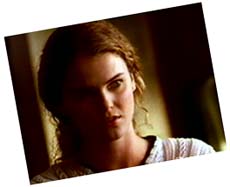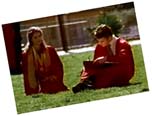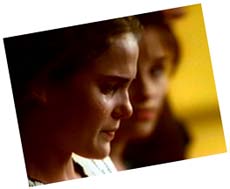A Something Burger
Felicity is what Ally McBeal wants to be.
Felicity debuts Sept. 29 on the WB network.

If Zeitgeist hunters had been out in force in 1966, there's no doubt which TV show would have made the covers of six zillion magazines and become a code word for the sexual politics of the day. That Girl, of course. Marlo Thomas as Anne Marie--trying to make it as an actress in New York, dating the amiable Donald Hollinger, prancing around her hot pink apartment--represented a new class of woman: brave but fragile, torn between independence and men. That's the message the media would have tried to sell you, anyway. In retrospect, That Girl symbolized little beyond Thomas' saucer eyes, hysterical giggle, and shiny helmet hairdo. The real work of exploring what it meant to be pretty and single and working for a living had to wait four years, until the arrival of The Mary Tyler Moore Show.
That Girl was a nothing burger, and it disappeared. I'm counting the days until Ally McBeal deservedly meets a similar fate. Here's a fact that should give the cheerleaders pause: The show's ratings often get stuck in the not very impressive 50s. According to an article in USA Today, the show's highest rating all last season was 9 percent. Ally McBeal may stand for little besides the icky calculation of its creators and the media's addiction to trends.

I was therefore prepared to loathe Felicity, which the WB network has promoted since last spring as an Ally for the college set. The sound bite description turns out to be unfair. If Felicity lives up to the pilot, it could stand in the same relation to Ally as The Mary Tyler Moore Show did to That Girl. One serves up a zoo of theatrical neurotics and looks for easy laughs at their expense. The other adores its confused characters and burrows inside their heads to find a deeper humor, warmer but also more raw.
The show starts off in California, where our eponymous heroine (Keri Russell, a quiet beauty whose curly, golden hair is half pre-Raphaelite, half Ivory girl) is about to graduate from high school. She's worked like a dog--sacrificing her social life and artistic inclinations--and is on track to go to Stanford and become a doctor. But as she's walking across the stage she suffers a mild nervous breakdown. What if she doesn't want to be a doctor? Maybe her life up till now has been a prison of parental expectations and unarticulated desires. On a strange high, she walks up to Ben Covington (Scott Speedman), the popular guy she's always had a crush on, and asks him to sign her yearbook. His cryptic reply hints that he's had his eye on her too, which makes her temporarily insane with joy. In a delirious epiphany, she decides to give up all her plans and follow Ben to college in New York.

O n paper this setup sounds contrived, but there's something exhilarating and true about its randomness. People who need to change often latch onto innocent bystanders, desperately imbuing them with totemic significance, then once the necessary change is made they're left to wonder what on earth they were thinking. Felicity arrives in New York, registers for classes, discovers that Ben is not exactly planning to marry her, and spends the rest of the first episode in a catatonic depression, stunned by the idiocy of her decision. She still likes Ben but realizes that she wasn't chasing him so much as running away from the life she'd prepared for.
Given the curiosity about the inner life of girls, the other obvious comparison here is My So-Called Life. As good as that show was, Felicity is better. Everyone knows that adolescence is a nightmarish cult experience. Kids are all hopped up on hormones and forced into conformist cliques, etc., etc. Felicity is set in the fresher territory of dawning adulthood, when people embark on the Sisyphean task of sorting through choices and becoming themselves. The show is saturated with real emotions: long pauses in which Felicity furrows her brow, trying to summon an appropriate response; funny, spastic speeches in which she struggles to say what the future grown-up in her actually feels. Another nice touch is that although Felicity is surrounded by amusing characters (besides Ben, a friend from English class and a residential adviser), you don't get the sense they're a chirpy rainbow ensemble cooked up to hit the right demographics or to supply cutesy comic relief. These are just people who live in the same dorm or happen to sit at the next desk--they're in her life.
There are exactly two false moments in the whole show (not bad for a pilot). One occurs right off the bat, when we first see Felicity sitting in an empty, haunted-looking bedroom, speaking into a tape recorder and describing her confusion to a friend who lives in New Mexico. Her voice sounds rapid and vapid and makes you fear you're in for a disastrous cocktail mix of 90210-style soap opera and artiness. The second false step occurs toward the end: Felicity is having dinner with her parents, who want her to come back to California and resume life as a dutiful robot. In a moment meant to symbolize her budding independence, she utters the unbelievably corny line "I can't wait to see New York when it snows."
Such lapses point to a latent pretentiousness in Felicity that could be a problem if it flares up. But they're forgivable, for now, because they seem connected to high ambitions. By simply taking it for granted that a young woman's life is worth following, Felicity renders all the babble about Ally McBeal and postfeminism irrelevant. Real thought has gone into this show--so much thought that the snob in me fears Felicity may not meet the WB's expectations of a breakout hit. I hope it does, though.